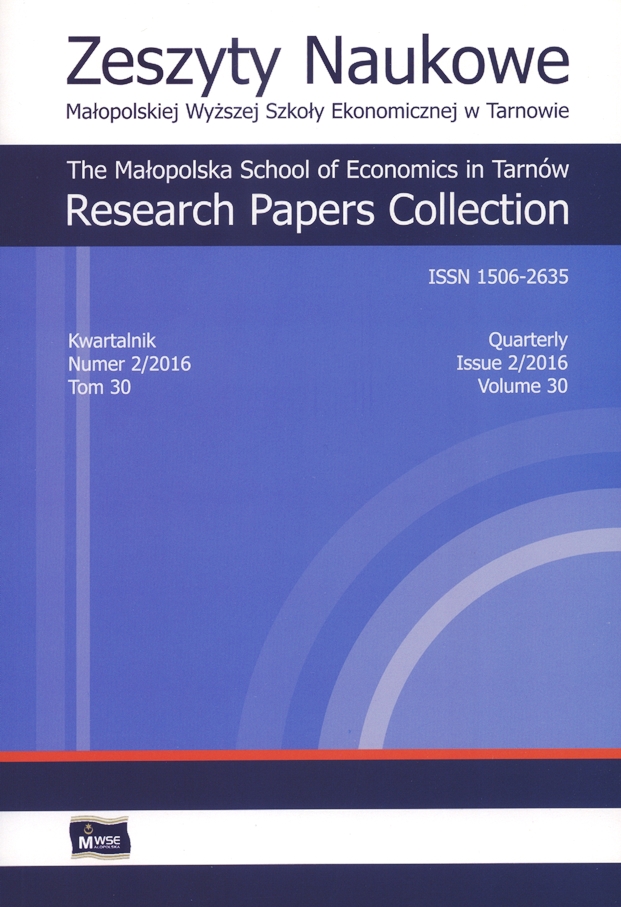Abstract
In the article a discussion on basic notions within the scope of tourist motivation and the theory of factors motivating to travel was presented. Their new perspective in the form of a trichotomy concept of tourist motivation factors was demonstrated. Within this concept three factor groups were singled out: motivators which, when present, generate an urge, propensity to participate in tourism; demotivators which, when they occur, cause a negative attitude towards tourist activity. Their impact sectors on tourist attractiveness of destinations (realm of tourist reception) differ dramatically, although they occur simultaneously in a tourist region (destination). Thus this concept constitutes a methodological directive suggesting an extension of the area of analysis of conducted research to include tourist motivation factors which have a nature of a destimulant of the researched environment.
References
Ahlström-Södeling, R. (2003). SME strategic business network seen as learning organization. Journal of Small Business and Enterprise Development, 10(4), 444–454.
View in Google Scholar
Alejziak, W. (1999). Turystyka w obliczu wyzwań XXI wieku. Kraków: Albis. ISBN 8390645262.
View in Google Scholar
Armstrong, M. (2000). Zarządzanie zasobami ludzkimi. Kraków: Wydawnictwo Profesjonalnej Szkoły Biznesu. ISBN 83-85441-86-7.
View in Google Scholar
Borodako, K. (2012). Współpraca sieciowa partnerów turystyki miejskiej na przykładzie Krakowa. W: T. Żabińska (red.). Turystyka na obszarach wiejskich. Uwarunkowania rozwoju. Narzędzia promocji (s. 60–71). Katowice: Wydawnictwo Uniwersytetu Ekonomicznego w Katowicach.
View in Google Scholar
Crompton, J.L. (1979). Motivations for pleasure vacation. Annals of Tourism Research, 6(4), 408–424.
View in Google Scholar
Dann, G.M.S. (1977). Anomie, ego-enhancement and tourism. Annals of Tourism Research, 4(4), 184–194.
View in Google Scholar
Franken, R.E. (2005). Psychologia motywacji. Gdańsk: Gdańskie Wydawnictwo Psychologiczne. ISBN 8389574616.
View in Google Scholar
Gangé, M., Deci, E.L. (2005). Self-determination theory and work motivation. Journal of Organizational Behavior, 26(4), 331–362.
View in Google Scholar
Garrod, B., Fyall, A. (2000). Managing heritage tourism. Annals of Tourism Research, 27(3), 682–708.
View in Google Scholar
Gaworecki, W.W. (2007). Turystyka. Warszawa: PWE. ISBN 9788320816655.
View in Google Scholar
Hellwig, Z. (1968). Zastosowanie metody taksonomicznej do typologicznego podziału krajów ze względu na poziom ich rozwoju oraz osoby i strukturę wykwalifikowanych kadr. Przegląd Statystyczny, 4.
View in Google Scholar
Herzberg, F. (1987). One more time: How do you motivate employees? Harvard Business Review, 65(5), 109–120.
View in Google Scholar
Herzberg, F., Mausner, B., Snyderman, B.B. (1959). The Motivation to Work. New York: John Wiley & Sons.
View in Google Scholar
Hudson, S. (2008). Tourism and Hospitality Marketing. A Global Perspective. Los Angeles; London: Sage Publications. ISBN 9781412946872.
View in Google Scholar
Iwasiewicz, A. (2000). Metody statystyczne zarządzania jakością [online, dostęp: 2015-07-10]. Stat Soft Polska. Dostępny w Internecie: http://www.statsoft.pl.
View in Google Scholar
Kocowski, T. (1982). Potrzeby człowieka. Koncepcja systemowa. Wrocław: Ossolineum.
View in Google Scholar
Kozioł, L. (2011). Trychotomy of motivating factors in the workplace: Concept outline. Zeszyty Naukowe Małopolskiej Wyższej Szkoły Ekonomicznej w Tarnowie, 19(2), 45–54.
View in Google Scholar
Kozioł, L., Pyrek, R. (2014), The concept of classification of tourist product: Some observations and a research agenda. W: V. Katsoni (ed.). Cultural Tourism in a Digital Era (pp. 57–66). Athens: Springer International Publishing. ISBN 9783319158594.
View in Google Scholar
Krippendorf, J. (1987). The Holidaymakers. London: Heinemann. McIntosh, R.W., Goeldner, Ch.R. (1986). Tourism: Principles, Practices, Philosophies. New York: John Wiley & Sons. ISBN 0471830380.
View in Google Scholar
Middleton, V.T.C. (1996). Marketing w turystyce. Warszawa: Polska Agencja Promocji Turystyki. ISBN 8386800259.
View in Google Scholar
MOT. (2014). Ruch turystyczny w Krakowie. Kraków: Małopolska Organizacja Turystyczna. ISSN 2299-2863 (print); ISSN 2299-2871 (online).
View in Google Scholar
Nawrot, Ł. (2006). Konkurencyjność regionu turystycznego – ujęcie teoretyczne. W: A. Rapacz (red.). Gospodarka turystyczna w regionie. Przedsiębiorstwo. Samorząd. Współpraca. Wrocław: Wydawnictwo Akademii Ekonomicznej im. O. Langego we Wrocławiu.
View in Google Scholar
Nooy, W. de, Mrvar, A., Batagelj, V. (2005). Exploratory Social Network Analysis with Pajek. Cambridge: Cambridge University Press. ISBN 9780521602624.
View in Google Scholar
Ostrowski, D. (2007). Zachowania konsumentów usług turystycznych. W: D. Dudkiewicz (red.). Marketing usług turystycznych. Warszawa: Wydawnictwo AlmaMer Wyższej Szkoły Ekonomicznej w Warszawie. ISBN 9788360197479.
View in Google Scholar
Panasiuk, A. (2012). Wstęp. W: J. Buko, A. Panasiuk (red.). Popyt turystyczny. Zagadnienia podstawowe. Szczecin: Wydawnictwo Naukowe Uniwersytetu Szczecińskiego.
View in Google Scholar
Pearce, P.L. (1999). Fundamentals of tourist motivation. W: D.G. Pearce, R.W. Butler (eds.). Tourism and Research: Critiques and Challenges. London: Routledge. ISBN 0415083192.
View in Google Scholar
Powell, R., Kokkranikal, J. (2015). Motivations and experiences of museum visitors: The case of the Imperial War Museum, United Kingdom. W: V. Katsoni (ed.). Cultural Tourism in a Digital Era (pp. 169–181). Athens: Springer International Publishing. ISBN 978-3-319-15859-4.
View in Google Scholar
Reykowski, J. (1975). Teoria motywacji a zarządzanie. Warszawa: PWE.
View in Google Scholar
Rheinberg, F. (2006). Psychologia motywacji. Kraków: WAM. ISBN 83-7318-640-9.
View in Google Scholar
Rudnicki, L. (2009). Styl życia jako czynnik kształtujący zachowanie konsumenta na rynku turystycznym. Zeszyty Naukowe Małopolskiej Wyższej Szkoły Ekonomicznej w Tarnowie, 14(3), 11–19.
View in Google Scholar
Screven, C. (1976). Exhibit evaluation – a goal referenced approach. Curator: The Museum Journal, 19(4), 271–290.
View in Google Scholar
Timothy, D.J., Boyd, S.W. (2003). Heritage Tourism. Harlow: Prentice Hall. ISBN 0-582-36970-3.
View in Google Scholar
Winiarski, R., Zdebski, J. (2008). Psychologia turystyki. Warszawa: Wydawnictwa Akademickie i Profesjonalne. ISBN 978-83-60807-88-0.
View in Google Scholar
© Copyright by Małopolska School of Economics in Tarnów. The articles are available under the Creative Commons Attribution NonCommercial-NoDerivatives 4.0 International License


